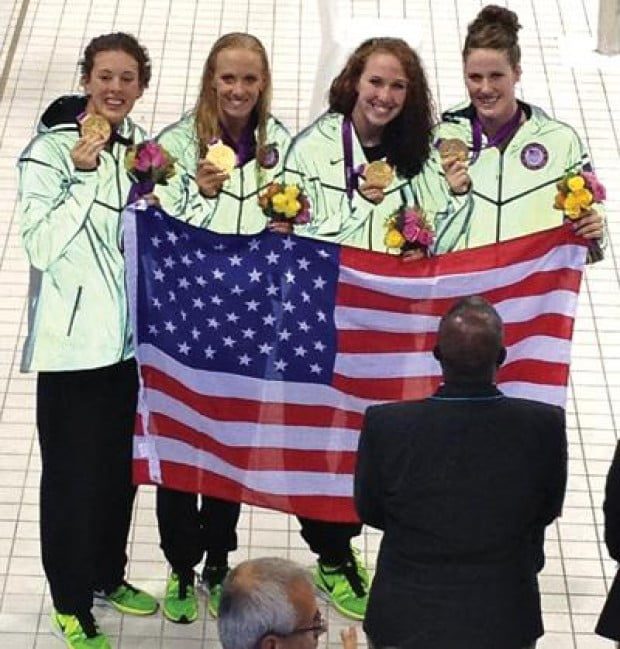
LONDON – China may dominate table tennis and the overall medal count, but swimming is as Ameri-“can” as apple pie thanks in part to a boy from Baltimore named Michael Phelps and the next generation he has inspired. In London this summer, Team USA garnered 31 medals overall in swimming (16 gold), while China won only 10 swimming medals (5 gold).
Michael Phelps came to London with a heavy load. He was carrying around the weight of six gold and two bronze medals won in the 2004 Athens Olympics and eight gold medals won four years later in China.
On Day 1 of the London Olympics, Phelps swam the 400-meter individual medley. Surprisingly, Phelps failed to win, place or show, coming in fourth—well behind USA team member Ryan Lochte, who came in first. You could see he was sad when he exited the pool and his broad shoulders were a bit slumped.
Phelps later admitted to the media that he was frustrated, but said he didn’t have time to dwell on it with so many more events coming later in the day.
“It’s not the start that I would have liked to have but I’ve just got to move up,” Phelps said, according to a London2012.com news article. “I have a bunch of other races and hopefully we can finish a lot better than we started. That’s what I’m going to try to do.”
Things went from sad to bad that same day when team USA came in second in the 4 x 100 meter freestyle relay to France despite leading for most of the race. Phelps also suffered another tough setback when he came in second in the 200 meter butterfly, his signature event, when he was “out-touched” at the wall by South Africa’s Chad le Clos.
The slump didn’t last too long though; Phelps and Team USA swam their hearts out throughout the rest of the games. Swimmer Dana Vollmer epitomized that heart. She managed to win three gold medals, including one world record in the 100 meter butterfly, with a time of 55.98 and an Olympic record in the women’s 4 x 200 meter freestyle relay with a time of 7:42.92.
Winning gold medals is no small accomplishment, but when you consider that Dana underwent surgery in 2003 to correct a serious heart condition and still has a secondary one that can cause her heart to stop at random, then those 3 gold medals are more than incredible. Vollmer is forced to carry a defibrillator with her in case of an emergency, but she doesn’t appear to have thought about it in yeas. In 2004, she told the Washington Post, “I would rather die swimming than not do it at all.”
Phelps managed to put his frustration behind him and make history again when he became the first person to win the same event (the 200 meter individual medley) three Olympics in a row over the span of 12 years. He also became the most decorated Olympian of all time with 20 medals after he finished his career with a win in the 4 x 200 meter freestyle.
On the same night Phelps won his final individual gold medal in the 100 meter butterfly race, 15-year-old American Katie Ledecky won gold in the 800 meter freestyle in her first Olympics. During the race, I was sitting next to Sid Cassidy, a longtime coach at the Saint Andrews School in Boca Raton, Fla.
Cassidy told me, “It is fantastic to be here to witness the incredible Phelps and watch him close out his career with style, then on the other end of the spectrum see a 15-year-old rookie take the baton and open her career with a historic win.”
The second-most decorated athlete of the Olympics behind Phelps was another American newcomer, young 17-year-old Missy Franklin. The Pasadena native won four gold medals and one bronze.
Regardless of the medal count, I was most impressed with how the Olympic swimmers inspired my own children. While we watched the races one night in the Aquatics Center, my 11-year-old informed me that he had decided to forego playing football in the fall and would opt to swim instead. He also insisted that we visit a local London public pool so he could work on his form because “every second counts.”
When Michael Phelps looks back on his career and retires to “travel the world,” I hope he knows that he won much more than medals these past few Olympics. He won over hearts and taught us to dream big, dive deep and swim it to win it!
